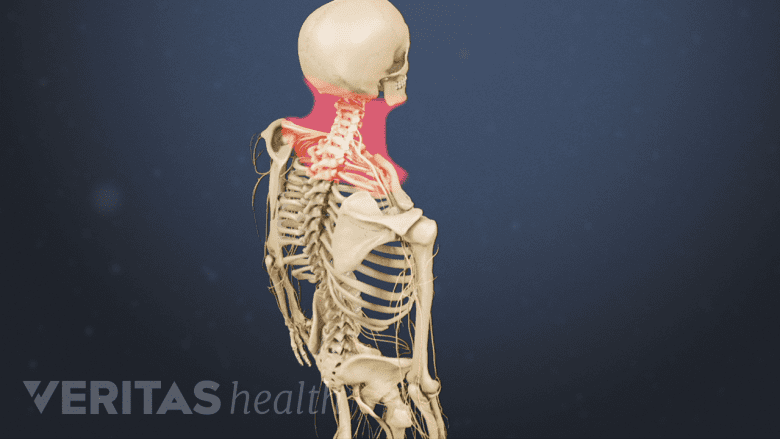The brain is at increased risk of injury while recovering from a concussion, and more susceptible to re-injury after recovery. A second concussion may be caused by less force and may require a longer recovery.1Committee on Sports-Related Concussions in Youth; Board on Children, Youth, and Families; Institute of Medicine; National Research Council; Graham R, Rivara FP, Ford MA, et al., editors. Sports-Related Concussions in Youth: Improving the Science, Changing the Culture. Washington (DC): National Academies Press (US); 2014 Feb 4. 5, Consequences of Repetitive Head Impacts and Multiple Concussions. Available from: http://www.ncbi.nlm.nih.gov/books/NBK185336/
See Getting Brain Rest After a Concussion
Patients recovering from concussion should be aware of the following risks:

Persistent concussion symptoms, like neck pain, are called post-concussion syndrome.
In This Article:
- Concussion and the Importance of Recovery Time
- Risks of Inadequate Concussion Recovery Time
- Factors Affecting Concussion Recovery
Greater risk of subsequent concussions. An injured brain is more susceptible to additional injury. For concussion patients who participate in high-speed/full-contact activities, this means it is easier to suffer a second concussion, even from a weaker impact. Once a patient has sustained a concussion, they may be at a greater risk of another concussion.2Patient Education: Concussion. American Association of Neurological Surgeons.Accessed October 2014.,3Guskiewicz KM, Bruce SL, Cantu RC, et al. National Athletic Trainers' Association Position Statement: Management of Sport-Related Concussion. J Athl Train. 2004;39(3):280-297.,4Guskiewicz KM, Mccrea M, Marshall SW, et al. Cumulative effects associated with recurrent concussion in collegiate football players: the NCAA Concussion Study. JAMA. 2003;290(19):2549-55.
Chronic traumatic encephalopathy (CTE).5Mckee AC, Cantu RC, Nowinski CJ, et al. Chronic traumatic encephalopathy in athletes: progressive tauopathy after repetitive head injury. J Neuropathol Exp Neurol. 2009;68(7):709-35. CTE is a controversial condition still being studied. It is described as a degenerative disease of the brain that affects people who have suffered multiple concussions and has only been found in former professional football players and boxers. CTE is only diagnosed post mortem (after death).
Post-concussion syndrome. When concussion symptoms persist after the initial concussive event it is sometimes referred to as post-concussion syndrome. Post concussion syndrome includes a complex collection of symptoms:6Mayo Clinic Staff. Post-concussion syndrome: Symptoms. Mayo Clinic. August 19, 2014. Available at http://www.mayoclinic.org/diseases-conditions/post-concussion-syndrome/basics/symptoms/con-20032705. Accessed October 2014.
- Headaches
- Neck pain
- Dizziness
- Motion sickness
- Insomnia and fatigue
- Irritability
- Anxiety
- Depression and irritability
- Loss of concentration and memory
- Noise and light sensitivity
Taking the time to get sufficient brain rest is an important step toward minimizing these symptoms. Seeing a concussion specialist early after the injury can also help reduce the duration of these symptoms.
Second impact syndrome. Controversial and impossible to predict, second impact syndrome (SIS) can occur as a result of any two events causing head trauma. If a second head injury is sustained while a patient is still experiencing post-concussion symptoms, cerebral swelling, brain herniation, and death can occur.7Bey T, Ostick B. Second impact syndrome. West J Emerg Med. 2009;10(1):6-10.
Most concussion patients will not experience these complications, but taking the time to rest immediately after a concussion event is critical.
- 1 Committee on Sports-Related Concussions in Youth; Board on Children, Youth, and Families; Institute of Medicine; National Research Council; Graham R, Rivara FP, Ford MA, et al., editors. Sports-Related Concussions in Youth: Improving the Science, Changing the Culture. Washington (DC): National Academies Press (US); 2014 Feb 4. 5, Consequences of Repetitive Head Impacts and Multiple Concussions. Available from: http://www.ncbi.nlm.nih.gov/books/NBK185336/
- 2 Patient Education: Concussion. American Association of Neurological Surgeons.Accessed October 2014.
- 3 Guskiewicz KM, Bruce SL, Cantu RC, et al. National Athletic Trainers' Association Position Statement: Management of Sport-Related Concussion. J Athl Train. 2004;39(3):280-297.
- 4 Guskiewicz KM, Mccrea M, Marshall SW, et al. Cumulative effects associated with recurrent concussion in collegiate football players: the NCAA Concussion Study. JAMA. 2003;290(19):2549-55.
- 5 Mckee AC, Cantu RC, Nowinski CJ, et al. Chronic traumatic encephalopathy in athletes: progressive tauopathy after repetitive head injury. J Neuropathol Exp Neurol. 2009;68(7):709-35.
- 6 Mayo Clinic Staff. Post-concussion syndrome: Symptoms. Mayo Clinic. August 19, 2014. Available at http://www.mayoclinic.org/diseases-conditions/post-concussion-syndrome/basics/symptoms/con-20032705. Accessed October 2014.
- 7 Bey T, Ostick B. Second impact syndrome. West J Emerg Med. 2009;10(1):6-10.

